Related Research Articles

Men at Work are an Australian rock band formed in Melbourne in 1978 and best known for breakthrough hits such as "Down Under", "Who Can It Be Now?", "Be Good Johnny", "Overkill", and "It's a Mistake". Its founding member and frontman is Colin Hay, who performs on lead vocals and guitar. After playing as an acoustic duo with Ron Strykert during 1978–1979, Hay formed the group with Strykert playing bass guitar and Jerry Speiser on drums. They were soon joined by Greg Ham on flute, saxophone, and keyboards and John Rees on bass guitar, with Strykert switching back to lead guitar. The group was managed by Russell Depeller, a friend of Hay, whom he met at La Trobe University. This line-up achieved national and international success during the early to mid-1980s.
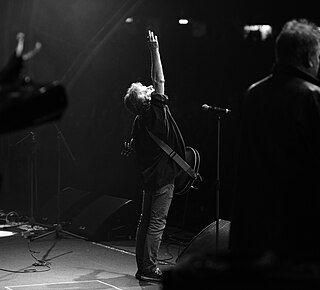
Moving Pictures are an Australian rock music band formed in 1980. Their debut album, Days of Innocence, was issued in October 1981 and eventually peaked at No. 1 on the Kent Music Report Albums Chart in February the following year. In January 1982, they released their single, "What About Me", which reached No. 1 on the Kent Singles Chart. Later that year, Elektra Records issued Days of Innocence and "What About Me" in North America. The single reached No. 29 on the Billboard Hot 100 and appeared on the associated year-end Hot 100 list for 1983. A proposed series of United States performances supporting REO Speedwagon, Tom Petty, and Hall & Oates fell through when Elektra was substantially reorganised.
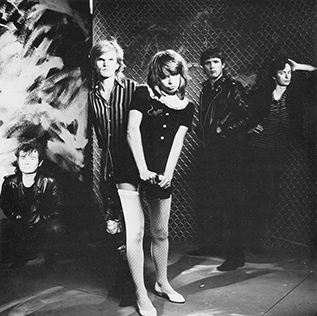
Divinyls were an Australian rock band that were formed in Sydney in 1980. The band primarily consisted of vocalist Chrissy Amphlett and guitarist Mark McEntee. Amphlett garnered widespread attention for performing on stage in a school uniform and fishnet stockings, and she often used an illuminated neon tube as a prop for displaying aggression towards both band members and the audience. Originally a five-piece, the band underwent numerous line-up changes, with Amphlett and McEntee remaining as core members, before its dissolution in 1996.
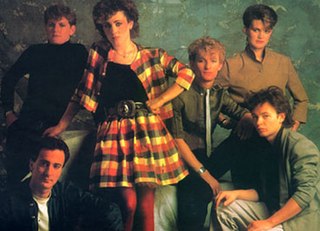
Eurogliders are a band formed in 1980 in Perth, Western Australia, which included Grace Knight on vocals, Bernie Lynch on guitar and vocals, and Amanda Vincent on keyboards. In 1984, Eurogliders released an Australian top ten album, This Island, which spawned their No. 2 hit single, "Heaven ". "Heaven" also peaked at No. 21 on the United States Billboard Mainstream Rock charts and appeared on the Hot 100. Another Australian top ten album, Absolutely, followed in 1985, which provided two further local top ten singles, "We Will Together", and "Can't Wait to See You". They disbanded in 1989, with Knight having a successful career as a jazz singer. Australian rock music historian Ian McFarlane described Eurogliders as "the accessible face of post-punk new wave music. The band's sophisticated brand of pop was traditional in its structure, but displayed the decidedly 'modern veneer' ". The band reformed in 2005 releasing two new albums followed in 2014 by their seventh album.
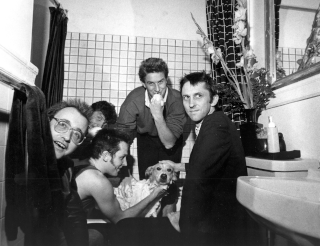
Mental As Anything are an Australian new wave and pop rock band that formed in Sydney in 1976. Its most popular line-up was Martin Plaza on vocals and guitar; Reg Mombassa on lead guitar and vocals; his brother Peter "Yoga Dog" O'Doherty on bass guitar and vocals; Wayne de Lisle on drums; and Andrew "Greedy" Smith on vocals, keyboards and harmonica. Their original hit songs were generated by Mombassa, O'Doherty, Plaza and Smith, either individually or collectively; they also hit the Australian charts with covers of songs by Roy Orbison, Elvis Presley, and Chuck Berry.

The Dynamic Hepnotics were an Australian soul, blues and funk band which formed in 1979 and disbanded in 1986. Mainstay, lead vocalist and front man, "Continental" Robert Susz formed the group in Sydney. They had chart success on the Australian Kent Music Report Singles Chart with a top 5 single, "Soul Kind of Feeling" in 1984. It was followed by "Gotta Be Wrong " which reached the top 20 in 1985. Their album, Take You Higher, reached the top 20 on the related Albums Chart in June. In 1986, "Soul Kind of Feeling" won the APRA Music Award for 'Most Performed Australasian Popular Work'.
Charlie was a British rock band formed in 1971 by singer/songwriter Terry Thomas. The group was most active as a recording unit from the mid-1970s to 1986. Charlie never charted in the UK but had four minor hits in the US: "Turning To You" (1977) "She Loves to Be In Love" (1978), "Killer Cut" (1979) and "It's Inevitable" (1983).
Kids in the Kitchen are an Australian pop, funk and new wave band which formed in 1983. They enjoyed chart success with four top-20 hits on the Australian Kent Music Report Singles Chart, "Change in Mood" (1983), "Bitter Desire" (1984), "Something That You Said" and "Current Stand". The related album, Shine, reached No. 9 on the Kent Music Report Albums Chart and was the 16th-biggest-selling album of 1985 in Australia. A second album, Terrain, followed in August 1987 but did not chart and the group disbanded in 1988. Kids in the Kitchen supported the Australian leg of Culture Club's 2016 world tour.
Matt Finish are an Australian rock band formed in mid-1979 by singer-songwriter and guitarist Matt Moffitt (1956–2003) and drummer, composer and producer John Prior. The 1981 line-up of Moffitt, Prior, Richard Grossman on bass guitar and Jeff Clayton on rhythm guitar recorded their debut album, Short Note, which peaked at No. 14 on the Australian Kent Music Report Albums Chart. The title song, "Short Note", peaked at No. 33 on the related Singles Chart and became a standard on Australian radio stations. Grossman was later a member of Divinyls and Hoodoo Gurus. On 13 August 2003 Moffit died in his sleep, aged 46. From 2006 Prior has continued Matt Finish with various line-ups.
Boss were a hard rock band, which formed in 1979 in Adelaide. Long-term members were Craig Csongrady on lead vocals and Kevin Pratt on lead guitar. The group issued a sole album, Step on It, in October 1984 before disbanding in 1986. Three members from the final line-up, Csongrady, Pratt and Peter Heckenberg (drums), founded another hard rock group, BB Steal, in 1987.
Machinations are an Australian synthpop band which formed in 1980. They reached the top 20 on the Kent Music Report albums chart with Big Music in 1985. Their top 30 hits on the related singles chart are "Pressure Sway", "No Say in It", "My Heart's On Fire" and "Do to You". By 1989 the group had disbanded. They briefly reunited in 1997 and then reformed in 2012.
Uncanny X-Men were an Australian pop rock band which formed in late 1980. Their founding mainstay was lead singer Brian Mannix. Originally with Nick Matandos on drums and Ron Thiessen on guitar, they were soon joined by Chuck Hargreaves on guitar and Steve Harrison on bass guitar. John Kirk replaced Harrison and Craig Waugh replaced Matandos by 1984. The band's debut album, 'Cos Life Hurts, peaked at No. 3 on the Australian Kent Music Report, and provided their highest-charting single "50 Years" which reached No. 4 on the related singles chart. Thiessen left to be eventually replaced by Brett Kingman. Their second album, What You Give is What You Get, reached No. 19, and included a top 20 single, "I Am" (April). The group disbanded in 1987 and have occasionally reunited to play live concerts. Mannix has had a solo career as a singer, TV personality and actor.
The Allniters are a Sydney-based Australian ska pop band, founded in 1980. Original line-up was Ted Ayers on sax, Dave Bebb on drums, Stuart Crysell on guitar, Martin Fabok on guitar, Peter Hill-Travis on vocals, Graham Hood on bass guitar, Brett Pattinson on vocals and Mark Taylor on keyboards. Numerous changes occurred in band members with Fabok, Hill-Travis and Pattinson common to almost all line-ups.
Goh Tee Haut, known professionally as Rex Goh, is a Singaporean-born Australian rock guitarist. In 1972 Goh moved to Australia. He has been a band member of various groups including Air Supply, QED (1983–85), and Eurogliders.
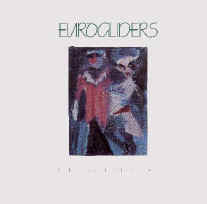
Pink Suit Blue Day is the debut album by Australian rock band Eurogliders, released in 1982. Their debut single, "Without You", was released in June and entered the top 40 of the Australian Kent Music Report singles chart. A follow-up single, "Laughing Matter" in September did not chart.
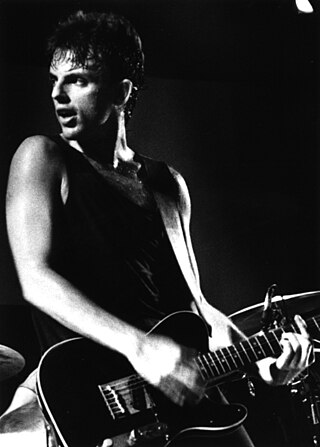
Matthew David Moffitt was an Australian singer-songwriter and guitarist. He fronted the rock band, Matt Finish, and worked as a solo artist. Matt Finish were a popular live band, which had a top 20 hit on the Kent Music Report singles chart with "Short Note" (1981).

For the Danish heavy metal band, see Geisha.
Grace Ethel Knight is an English-born Australian vocalist and songwriter. During the 1980s she was a mainstay of pop group Eurogliders which formed in Perth, Western Australia. Knight later became a solo jazz singer and musician based in Sydney. In 1984, Eurogliders released an Australian top ten album, This Island, which spawned their No. 2 hit single, "Heaven ". "Heaven" also peaked at No. 21 on the United States' Billboard Mainstream Rock charts and appeared on the Hot 100. The song, written by Eurogliders' guitarist, Bernie Lynch, and vocals by Knight, was their only hit in United States. Knight and Lynch married in 1985 but separated soon after. Another Australian top ten album, Absolutely, followed for Eurogliders in 1985, which provided three further local top ten singles, "We Will Together", "The City of Soul" and "Can't Wait to See You".
QED were an Australian new wave band who had a top twenty hit single, "Everywhere I Go", on the Australian Kent Music Report in 1984. The band's lead singer, Jenny Morris, later went on to achieve commercial success as a solo artist.

Amanda Villepastour is an Australian ethnomusicologist and former professional musician. She is best known for being the keyboardist of the Australian new wave band Eurogliders between 1980 and 1987, and for her 21st-century research work and publications on Yorùbá music in Nigeria, and Afro-Cuban religious (Santería) music in Cuba.
References
- 1 2 3 4 5 6 Kent, David (1993). Australian Chart Book 1970–1992 . St Ives, NSW: Australian Chart Book. ISBN 0-646-11917-6. NOTE: Used for Australian Singles and Albums charting from 1970 until ARIA created their own charts in mid-1988.
- 1 2 3 Holmgren, Magnus; Warnqvist, Stefan. "The Expression". Australian Rock Database. Passagen.se (Magnus Holmgren). Archived from the original on 22 October 2013. Retrieved 10 March 2014.
- ↑ "Paul Goldman filmography". IMDb . Retrieved 8 May 2009.
- ↑ "Countdown Playlist". Australian Broadcasting Corporation (ABC). Archived from the original on 29 June 2008. Retrieved 8 May 2009.
- ↑ "The Expression". Allmusic . Macrovision . Retrieved 8 May 2009.
- ↑ "The Expression – Conscience". Discogs . Retrieved 8 May 2009.
- ↑ "The Expression – Conscience". What It Is Records. Retrieved 8 May 2009.[ dead link ]
- ↑ "The Expression – Rare & Un-Released". What It Is Records. Retrieved 8 May 2009.[ dead link ]
- ↑ "Rare & Un-Released". Almacantar Records. Archived from the original on 7 October 2007. Retrieved 8 May 2009.
- ↑ "Countdown to the Awards" (Portable document format (PDF)). Countdown Magazine. Australian Broadcasting Corporation (ABC). March 1987. Retrieved 16 December 2010.